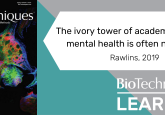Exercise, lactate and depression: what’s the link?

Researchers have revealed aspects of the mechanism linking exercise, lactate and depression, bringing the field closer to more effective therapeutics for the condition.
To many, lactate likely triggers thoughts of its precursor, lactic acid, and the searing muscle cramps that it can induce after strenuous exercise. However, in recent years, the impact of lactate has been increasingly linked to the commonly observed mental health benefits that accompany physical exercise.
With more attention being drawn to mental health disorders – the WHO lists depression as the leading cause of disability worldwide – and current treatments proving effective for roughly 30% of patients, interest in the association between physical exercise and mental health has risen.
One team focusing on this phenomenon is the lab of Jean-Luc Martin at the Swiss National Centre of Competence in Research into Mental Illness (Synapsy; Lausanne University, Switzerland). The lab has previously determined that the administration of lactate at equitable doses to those produced during exercise has positive antidepressant effects in mice. Commenting on this previous finding, Martin revealed that, “lactate decreases anhedonia in particular… which involves losing interest or pleasure in all those activities that, prior to depression, were considered enjoyable.”
 Improved mental health shows increased serotonin transporters in the brain
Improved mental health shows increased serotonin transporters in the brain
The 5-HTT transporter protein is considered to play a central role in the development of depression as it pumps serotonin, which affects mood and emotion, away from cerebral neuron synapses, limiting the amount of active serotonin that reaches the brain.
To explore the mechanism behind this finding, the team focused on the process of adult neurogenesis in the hippocampus. Adult neurogenesis is the process by which new neurons are produced from stem cells to replace old or damaged neurons. This process is disrupted in the brains of depressives, reducing the volume of the hippocampus: a region of the brain associated with memory and depression.
Conducting behavioral studies followed by immunohistochemistry and confocal microscopy techniques, the team established that lactate restores neurogenesis and decreased the prevalence and intensity of depressive behavior in mice. They also showed that when adult neurogenesis was blocked, lactate was unable to reverse these behaviors. This confirms that lactate has an active impact on the neuronal health in the brain.
To better understand how lactate impacts neurogenesis, the team studied its metabolites, first finding that pyruvate, which lactate is oxidized to during its metabolism, is not responsible for the benefit. However, during the conversion of lactate to pyruvate, the antioxidant molecule NADH is produced. Lead author of the study Anthony Carrard (Lausanne University Hospital, Switzerland) declared that it is, “NADH and its antioxidant properties that protect neurogenesis during a depressive episode – or at least during a modeling of some of these symptoms in animals.”
The next step for the team is to identify which proteins are impacted by NADH, enabling it to influence adult neurogenesis. Once understood, researchers will be in much a better position to design more effective treatments for depression.





